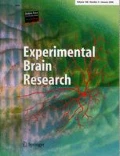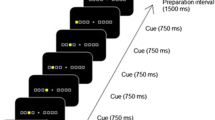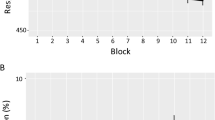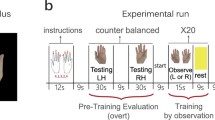Abstract
Practising a motor skill can result in effector-dependent learning (learning that does not transfer from the set of muscles used in training to a new set of muscles). Proceeding from neurophysiological evidence of motor activation during action observation, this study asked whether observational learning, learning through observation of skilled performance, can also be effector-dependent. Adult human participants observed a model’s right hand as the model responded to an eight-item sequence in a serial reaction time (SRT) task. Their sequence learning was then compared in two tests with that of controls who had observed the model’s right hand responding to random targets during training. All participants performed the SRT task with their right hand in the first test and with their left hand in the second. Evidence of observational learning was obtained in the right hand test but not in the left hand test. This implies that sequence learning based on observation of right hand performance did not transfer to the left hand, and therefore that observational learning can support effector-dependent learning of finger movement sequences. A second experiment used the same procedure to assess learning by a group of participants who observed a sequence of response locations only. This group did not observe the model’s responses. Results suggested that action observation was necessary for the effector-dependent observational learning demonstrated in Experiment 1.



Similar content being viewed by others
References
Aziz-Zadeh L, Maeda F, Zaidel E, Mazziotta J, Iacoboni M (2002) Lateralization in motor facilitation during action observation: a TMS study. Exp Brain Res 144:127–131
Bapi RS, Doya K, Harner AM (2000) Evidence for effector independent and dependent representations and their differential time course of acquisition during motor sequence learning. Exp Brain Res 132:149–162
Buccino G, Binkofski F, Fink GR, Fadiga L, Gallese RJ, Seitz RJ, Zilles K, Rizzolatti G, Freund H-J (2001) Action observation activates premotor and parietal areas in a somatotopic manner: an fMRI study. Eur J Neurosci 13:400–404
Cohen A, Ivry RI, Keele SW (1990) Attention and structure in sequence learning. J Exp Psychol Learn Mem Cogn 16(1):17–30
Fadiga L, Fogassi L, Pavesi G, Rizzolatti G (1995) Motor facilitation during action observation: a magnetic stimulation study. J Neurophysiol 73:2608–2611
Grezes J, Decety J (2001) Functional anatomy of execution, mental simulation, observation, and verb generation of actions: a meta-analysis. Hum Brain Map 12(1):1–19
Heiser M, Iacoboni M, Maeda F, Marcus J, Mazziotta JC (2003) The essential role of Broca’s area in imitation. Eur J Neurosci 17:1123–1128
Heyes CM, Foster CL (2002) Motor learning by observation: evidence from a serial reaction time task. Q J Exp Psychol A 55:593–607
Hikosaka O, Nakamura K, Sakai K, Nakahara H (2002) Central mechanisms of motor skill learning. Curr Opin Neurobiol 12(2):217–222
Iacoboni M, Woods RP, Brass M, Bekkering H, Mazziotta JC, Rizzolatti G (1999) Cortical mechanisms of human imitation. Science 286:2526–2528
Japikse KC, Negash S, Howard JH, Howard DV (2003) Intermanual transfer of procedural learning after extended practice of probabilistic sequences. Exp Brain Res 148:38–49
Keele SW, Jennings P, Jones S, Caulton D, Cohen A (1995) On the modularity of sequence representation. J Mot Behav 27(1):17–30
Marcovitch S, Flanagan AR (2005) Effector-specific learning of hand target sequences. (in preparation)
Nakahara H, Doya K, Hikosaka O (2001) Parallel cortico-basal ganglia mechanisms for acquisition and execution of visuomotor sequences—a computational approach. J Cogn Neurosci 13(5):626–647
Nissen MJ, Bullemer P (1987) Attentional requirements of learning—evidence from performance-measures. Cogn Psychol 19(1):1–32
Rand MK, Hikosaka O, Miyachi S, Lu X, Miyashita K (1998) Characteristics of a long-term procedural skill in the monkey. Exp Brain Res 118:293–297
Rand MK, Hikosaka O, Miyachi S, Lu X, Nakamura K, Kitaguchi K, Shimo Y (2000) Characteristics of sequential movements during early learning period in monkeys. Exp Brain Res 131:293–304
Rizzolatti G, Fogassi L, Gallese V (2001) Neurophysiological mechanisms underlying the understanding and imitation of action. Nat Neurosci 2(9):661–670
Sakai K, Kitaguchi K, Hikosaka O (2003) Chunking during human visuomotor sequence learning. Exp Brain Res 152:229–242
Strafella AP, Paus T (2000) Modulation of cortical excitability during action observation: a transcranial magnetic stimulation study. Neuroreport 11:2289–2292
Verwey WB, Wright D (2004) Effector-independent and effector-dependent learning in the discrete sequence production task. Psychol Res 68:64–70
Acknowledgements
This research was supported by the Economic and Social Research Council (ESRC) research centre for Economic Learning and Social Evolution (ELSE), and by a PhD studentship awarded to Geoffrey Bird by the Biotechnology and Biological Sciences Research Council (BBSRC).
Author information
Authors and Affiliations
Corresponding author
Rights and permissions
About this article
Cite this article
Osman, M., Bird, G. & Heyes, C. Action observation supports effector-dependent learning of finger movement sequences. Exp Brain Res 165, 19–27 (2005). https://doi.org/10.1007/s00221-005-2275-0
Received:
Accepted:
Published:
Issue Date:
DOI: https://doi.org/10.1007/s00221-005-2275-0




